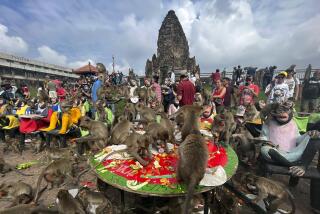Farmer Hopes Monkeys See, Monkeys Do
- Share via
BAN MAE RAM, Thailand — Up in a hilly village, the teacher is having trouble controlling his class.
About 20 macaque monkeys chained to wooden poles shriek, hop and pull each other’s tails in excitement as their instructor, Tawee Phanthachange, shows up to start a lesson.
Tawee, who owns orchards of tamarind, mango and coconut, is teaching the monkeys how to pick fruit.
His venture near the resort town of Chiang Mai, 360 miles north of Bangkok, is not unique. Monkeys have been used to harvest coconuts in southern Thailand for generations. But Tawee is the first farmer in the north to try to use them to pick softer fruit.
Concerned by the rising cost of hiring farm workers, Tawee bought 20 monkeys this year for about 2,000 baht ($50) each. Training them is difficult, but Tawee, a former army sergeant, says he is making progress.
“It is not an easy task, but achievable by patience and affection,” the 54-year-old farmer says.
As Tawee works with the monkeys, Leonardo climbs up his shoulders and sits on his head. After a gentle admonishment, the monkey clambers down to join his classmates.
Coconut was the first fruit Tawee introduced to his students. Holding a half-ripe greenish-brown coconut by its stem, he moves from one monkey to another, calling them by their names.
The monkeys are allowed to twist the coconut around the stem, until Tawee lets go--showing how the fruit will come loose from the tree.
Tawee claps his hands to applaud Timor for doing the job properly. He gives the little grayish-brown macaque a hug.
“A banana is the usual reward, but affection is also a good stimulant since monkeys love attention,” he says.
To harvest sweet tamarinds, the macaques are being taught to shake branches of the huge trees, as high as a three-story house, to make the ripe fruit fall.
“They are allowed to eat as much fruit as they want as long as they keep shaking the trees,” Tawee says.
Harvesting mangoes will be the next lesson, but how soon depends on how good they are with coconuts and tamarind. Tawee expects the training to last from six months to a year.
Until late last year, Tawee had hired migrant workers from neighboring countries who had been streaming into Thailand to work since an economic boom started in the mid-1980s.
But after a severe financial crunch hit Southeast Asia in summer 1997, Thailand faced a sharp rise in unemployment. To make more jobs available for Thais, the government deported 130,000 of the about 1 million guest workers, most of them to neighboring Myanmar.
Still, it has not been easy for Tawee and other farmers to find Thais willing to do menial jobs.
“Thais do not like this kind of hard work. It is frustrating . . . . It also costs more,” he says.
Tawee concedes that monkeys will never replace humans completely. Some types of fruit can’t be harvested by monkeys--strawberries and loganberries, for example, which are too delicate for a monkey’s grab-and-pull technique. Watermelons also are problematic, being too heavy for the animals.
“But monkeys are still an alternative. They are loyal . . . and not afraid of heights,” Tawee says. “On top of it, they neither complain nor ask for a raise.”
More to Read
Sign up for Essential California
The most important California stories and recommendations in your inbox every morning.
You may occasionally receive promotional content from the Los Angeles Times.













